- 2012 Kawasaki Versys 1000
2012 Kawasaki Versys 1000 Review
Roads less travelled
Indulge your desire for discovery and make the journey as exciting as the destination. The new Versys 1000 combines contemporary cutting-edge style with Kawasaki’s unique engineering approach. Enjoy the roads less travelled and realise your distance dreams on the adaptable multi-purpose Versys 1000.
Versys 1000 extends Kawasaki any-street promise
The Versys gets bigger brother for 2012. Answering the demand from riders looking for a dynamic machine in this category, Kawasaki now takes another bold step in the multi-purpose market with the new Versys 1000.
Created as the long-awaited big brother of Kawasaki’s mid-size any-road street surfer, the new Versys 1000 is designed to enable the greatest riding enjoyment in the widest variety of street riding situations. Whether riding solo or two-up, around the corner or around the globe, its unique combination of a highly responsive In-Line Four engine tuned for flexibility, and a nimble chassis fitted with dynamic suspension will answer the evolving needs of many existing Kawasaki customers and look set to draw others to the brand for the very first time. With the Versys 1000, Kawasaki extends its any-street promise to the litre-bike class.
2012 Kawasaki Versys 1000 Key Features
- Long-travel suspension front & rear allows riders to enjoy sports and touring riding on a variety of streets and conditions
- Upright and very comfortable riding position offers a high level of control with confidence in various situations
- Sporty, nimble handling due to the lightweight aluminium twin-tube frame
- 1,043 cc In-line-four which pulls strongly throughout the entire rev range
- Adjustable windscreen
- Functional and robust bodywork offers high wind protection
- Long range thanks to a 21.5 L fuel tank
- KTRC (Kawasaki TRaction Control)
- 3 modes cover a wide range of conditions
- Power Mode selection
- 2 modes: Full Power + Low Power (about 75% of Full)
- Latest-spec ABS standard
- Robust rear frame designed for heavy payload
- Gears selected for a wide range of riding situations
- 17” wheels: ideal for sport and tour riding
- Numerous genuine accessories
- Upright and very comfortable riding position offers a high level of control with confidence in various situations
- Sporty, nimble handling due to the lightweight aluminium twin-tube frame
- 1,043 cc In-line-four which pulls strongly throughout the entire rev range
- Adjustable windscreen
- Functional and robust bodywork offers high wind protection
- Long range thanks to a 21.5 L fuel tank
- KTRC (Kawasaki TRaction Control)
- 3 modes cover a wide range of conditions
- Power Mode selection
- 2 modes: Full Power + Low Power (about 75% of Full)
- Latest-spec ABS standard
- Robust rear frame designed for heavy payload
- Gears selected for a wide range of riding situations
- 17” wheels: ideal for sport and tour riding
- Numerous genuine accessories
2012 Kawasaki Versys 1000 Features and Benefits
Impressive In-Line Four
To maximise the Versys 1000’s fun factor, engineers wanted to provide the most exciting engine possible. The engine needed to deliver more than just performance figures. The engine they chose was a 1,043 cm3 In- line Four, tuned for flexibility. Superb throttle response, strong torque at all rpm (especially in the low-mid range), and a seductive intake howl ensure that every twist of the throttle delivers a physical and aural sensation that riders may easily find addictive.
Power Mode Selection
A choice of Full Power or Low Power modes allows riders to set power delivery to suit preference and conditions. Low Power mode limits output to approximately 75% of Full Power and delivers a milder throttle response. (Reduction of both power and throttle response varies according to engine speed (rpm), throttle position and gear position.)
Aluminium Twin-tube Frame
Aluminium twin-tube frame design features frame beams that go over engine, allowing a narrow construction that is easy to grip with the knees.
Lightweight and highly rigid, the frame uses the engine as a stressed member. The frame contributes to handling, offering a firm, planted feeling, good stability and light, nimble turning. The frame is a 5-piece cast aluminium construction, consisting of steering stem, left and right main frames, and two cross pieces. The two main frame components have open C-shaped cross sections and were die-cast to ensure a smooth surface finish.
Lightweight and highly rigid, the frame uses the engine as a stressed member. The frame contributes to handling, offering a firm, planted feeling, good stability and light, nimble turning. The frame is a 5-piece cast aluminium construction, consisting of steering stem, left and right main frames, and two cross pieces. The two main frame components have open C-shaped cross sections and were die-cast to ensure a smooth surface finish.
Adjustable front fork
The fork is adjustable for rebound damping (right-side only) and preload.
Easy adjustable rear shock
A remote preload adjuster means changes to suit tandem riding or luggage can be made quickly and easily by hand. The rear shock is also adjustable for rebound damping.
ABS brakes
ABS is standard on the Versys 1000. The 300 mm front petal discs are gripped by opposed 4-piston calipers offering strong stopping power with good brake touch and feel. At the rear a 250 mm petal disc is slowed by a single-piston caliper.
Adjustable windscreen
The adjustable windscreen has a stepless range of approximately 30 mm. Height can be adjusted by hand and without tools (using two knobs on the front of the screen) to suit rider preference.
Wide, rigid-mount handlebar
Wide, rigid-mount handlebar offers easy control, especially for low-speed manoeuvring. Positioned to offer a natural grip, it allows the rider’s elbows to be slightly bent when sitting in a relaxed, upright stance.
Rider & Passenger Comfort
Thickly padded seat (about double the cushioning of the Z1000 seat) provides the comfort to enable hundreds of miles in the saddle. The rear seat has even deeper cushioning, and is probably Kawasaki’s most comfortable passenger perch yet. Seat leather material was carefully selected and a great deal of effort was spent to ensure a good fit. The front seat uses different material than the sides and rear. A two-tone design is used on white models.
High Payload & Carrying Capacity
Robust steel pipe rear frame enables the substantial payload of 220 kg
Comfortable passenger grip
Ergonomic grab bars provide comfortable passenger grips.
Large-volume Fuel Tank
21 L fuel tank contributes to the Versys 1000’s touring potential. With engine and transmission settings, range (calculated) on one tank could last up to 250 miles. New-design fuel gauge inside the fuel tank enables a very precise estimation of remaining range. By displaying an average reading, inclines do not affect the reading.
Instrumentation
Tough-design multi-function instrumentation includes an analogue-style tachometer and LCD with speedometer, fuel gauge, odometer, clock, dual trip meters, current and average fuel consumption, remaining range, and external air temperature.
Responsive Engine
Liquid-cooled, DOHC, 16-valve 1,043 cm3 In-line Four with a bore and stroke of 77.0 x 56.0 mm offers strong low-mid range torque with smooth power delivery. Compared to the Z1000, the engine delivers a stronger low-mid range with a slightly reduced peak power. Both peak power and torque occur at lower rpm than on the Z1000.
Downdraft throttle bodies allow intake air to travel to the engine in the shortest possible distance, contributing to performance. While downdraft throttle bodies often use short intake funnels to maximise high-rpm performance, the Versys 1000’s are longer to offer the best power characteristics for street riding excitement.
Power delivery is quite linear and, thanks to refined FI settings, response is both quick and silky smooth. Both characteristics facilitate control (especially for low-rpm manoeuvres or when rolling the throttle back on) and contribute to multi-purpose and sport riding potential.
Flexible engine character means the Versys 1000 will be just as happy cruising along at low-rpm as it is being ridden more aggressively in the mid-high rpm range.
Downdraft throttle bodies allow intake air to travel to the engine in the shortest possible distance, contributing to performance. While downdraft throttle bodies often use short intake funnels to maximise high-rpm performance, the Versys 1000’s are longer to offer the best power characteristics for street riding excitement.
Power delivery is quite linear and, thanks to refined FI settings, response is both quick and silky smooth. Both characteristics facilitate control (especially for low-rpm manoeuvres or when rolling the throttle back on) and contribute to multi-purpose and sport riding potential.
Flexible engine character means the Versys 1000 will be just as happy cruising along at low-rpm as it is being ridden more aggressively in the mid-high rpm range.
3-Mode KTRC (Kawasaki TRaction Control)
Featuring the same system offered on the 2012 ZZR1400 flagship, the Versys 1000 KTRC system combines the best elements of Kawasaki’s two traction control systems, S-KTRC and KTRC. Three modes cover a wide range of riding conditions, offering either enhanced sport riding performance or the peace of mind to negotiate slippery surfaces with confidence.
Riders can choose from three modes. Modes 1 and 2 prioritise maximum forward acceleration (like the S-KTRC system on the 2011 Ninja ZX-10R). Mode 3 is similar to the KTRC system offered on the 2010 1400GTR, providing rider reassurance by facilitating smooth riding on slippery surfaces. Riders may also elect to turn the system off.
Riders can choose from three modes. Modes 1 and 2 prioritise maximum forward acceleration (like the S-KTRC system on the 2011 Ninja ZX-10R). Mode 3 is similar to the KTRC system offered on the 2010 1400GTR, providing rider reassurance by facilitating smooth riding on slippery surfaces. Riders may also elect to turn the system off.
Next-generation KYB 43 mm Inverted Fork
Fixing the cylinder inside the fork inner tube allows a larger cylinder diameter to be achieved: 25 mm (compared to 20 mm on
a conventional fork). The larger piston size contributes to a very composed suspension action.
a conventional fork). The larger piston size contributes to a very composed suspension action.
Horizontal Back-link Rear Suspension
Rear suspension positions the shock unit and linkage above the swingarm. This arrangement frees up space that would be taken up by the lower linkage of a conventional Uni-Trak suspension. This enables a larger pre-chamber, which in turn allows the use of a shorter muffler, contributing to mass centralisation.
Sporty 17” Wheels
Lightweight 6-spoke wheels measure 17” – ideal for this multi-pupose machine while also encouraging sporty street riding.
Multi-purpose Tyres
Pirelli Scorpion Trail tyres are matched to the chassis, offering excellent stability at highway speeds and good grip on a variety of road surface conditions.
Functional bodywork
Functional bodywork was designed to offer increased wind protection. Complementing the windscreen, voluminous front cowling sides and flared side fairings help protect the rider’s legs from the elements, further contributing to rider comfort.
Slim design seat
The seat’s slim design and the knee grip characteristics of the tank afford good freedom of movement, allowing the riders to change sitting position should they so choose. Thick urethane increases comfort and
contributes to a seat height that places the rider in a position of controllability. The
stepped shape of the seat also provides support for the rider when accelerating.
contributes to a seat height that places the rider in a position of controllability. The
stepped shape of the seat also provides support for the rider when accelerating.
Rubber coated footpegs
Spacious riding position is complemented by
footpegs with (hollow) rubber coatings. Footpeg brackets are also rubber mounted to
further dampen vibrations.
footpegs with (hollow) rubber coatings. Footpeg brackets are also rubber mounted to
further dampen vibrations.
Lightweight rear carrier
A lightweight resin-construction rear carrier (6 kg maximum capacity) is fitted as standard equipment. Accessory top-case (and mount) can be fitted.
Taillight
Taillight and rear turn signals are positioned for good visibility even when using the optional top-case and panniers.
High Fuel Efficiency
Advanced ECU programming contributes to the Versys 1000’s high fuel efficiency. Careful adjustment of fuel volume and ignition timing when speed is constant improves fuel consumption without compromising driveability.
The Economical Riding Indicator appears on the LCD screen to indicate favourable fuel consumption. Paying attention to conditions that result in the mark appearing can assist riders to maximise their fuel efficiency. This handy feature is active all the time, although to be effective, the rider must ride in a gentle manner: less than 6,000 rpm, less than 30% throttle and under 160 km/h.
The Economical Riding Indicator appears on the LCD screen to indicate favourable fuel consumption. Paying attention to conditions that result in the mark appearing can assist riders to maximise their fuel efficiency. This handy feature is active all the time, although to be effective, the rider must ride in a gentle manner: less than 6,000 rpm, less than 30% throttle and under 160 km/h.
2012 Kawasaki Versys 1000 Accessories (UK prices shown)
PANNIERS 2x35L
Monokey, 2 x 35 litres capacity will fit most helmets. Covers in body colour to be ordered separately.
Black / 131LUU0004
£ 316.95
£ 316.95
HANDGUARDS
The Kawasaki handguards are equipped with an aluminum bar for the strongest protection available.
(Only for Versys 2010 model onwards)
(Only for Versys 2010 model onwards)
Available soon **
217HGS0011 £ 144.95 **
Hand guard shells black / 217HGS0008 £ 21.95
Hand guard shells black / 217HGS0008 £ 21.95
COVER TOP CASE 47L
Colour matched top shell cover, specifically designed for the 1400GTR.
Available soon **
131LUU0055 **
(27Y) Metallic Magnesium Grey / 131LUU0023
£ 90.95
(27Y) Metallic Magnesium Grey / 131LUU0023
£ 90.95
Topcase 47L
Top case providing a maximum 47 litres of storage space. Exclusive Kawasaki design to match the style of the motorcycle. Comes complete with base plate. Colour matched cover to be ordered separately.
232LUU0020
£ 128.95
£ 128.95
BACKREST PAD TOP CASE 47L
Once attached to the topcase provides additional comfort for the pillion passenger.
130SBC0003
£ 31.95
£ 31.95
2012 Kawasaki Versys 1000 - USA Specifications/Technical Details
US MSRP Price: $TBA USD
US MSRP Price: $TBA USD
TBA
2012 Kawasaki Versys 1000 - Canadian Specifications/Technical Details
Canada MSRP Price: See Canadian Kawasaki Dealer for pricing.
Canada MSRP Price: See Canadian Kawasaki Dealer for pricing.
TBA
2012 Kawasaki Versys 1000 - UK/European Specifications/Technical Details
UK/EU MSRP Price: See UK/European Kawasaki Dealer for pricing.
UK/EU MSRP Price: See UK/European Kawasaki Dealer for pricing.
Engine
Fuel system
Fuel injection: ø38 mm x 4 (Keihin) with oval sub-throttles
Ignition
Digital
Starting
Electric
Lubrication
Forced lubrication, wet sump
Engine type
Liquid-cooled, 4-stroke In-Line Four
Displacement
1,043 cm³
Bore x stroke
77.0 x 56.0 mm
Compression ratio
10.3:1
Valve/Induction system
DOHC, 16 valves
Transmission
Clutch
Wet multi-disc, manual
Primary reduction ratio
1.627 (83/51)
Gear ratios: 1st
2.692 (35/13)
Gear ratios: 2nd
1.950 (39/20)
Gear ratios: 3rd
1.529 (26/17)
Gear ratios: 4th
1.304 (30/23)
Gear ratios: 5th
1.136 (25/22)
Gear ratios: 6th
0.958 (23/24)
Final reduction ratio
2.867 (43/15)
Transmission
6-speed, return
Final Drive
Sealed chain
Frame
Frame type
Aluminium twin-tube
Rake/Trail
27? / 107 mm
Wheel travel, front
150 mm
Wheel travel, rear
150 mm
Tyre, front
120/70ZR17M/C (58W)
Tyre, rear
180/55ZR17M/C (73W)
Steering angle, left / right
34? / 34?
Suspension
Suspension, front
43 mm inverted fork with stepless
rebound damping and spring preload
adjustability
Suspension, rear
Horizontal Back-link, gas-charged,
with stepless rebound damping and
remote spring preload adjustability
Brakes
Brakes, front
Dual semi-floating 300 mm petal discs
Caliper: Dual opposed 4-piston
Brakes, rear
Single 250 mm petal disc
Caliper: Single-piston
Dimensions
Dimensions (L x W x H)
2,235 mm x 900 mm x 1,405 mm / 1,430 mm
Ground Clearance
155 mm
Wheelbase
1,520 mm
Seat height
845 mm
Fuel capacity
21 litres
Curb Mass
239 kg
Performance
Maximum power
86.8 kW {118 PS} / 9,000 rpm
Maximum torque
102 N.m {10.4 kgf.m} / 7,700 rpm
Fuel system
Fuel injection: ø38 mm x 4 (Keihin) with oval sub-throttles
Ignition
Digital
Starting
Electric
Lubrication
Forced lubrication, wet sump
Engine type
Liquid-cooled, 4-stroke In-Line Four
Displacement
1,043 cm³
Bore x stroke
77.0 x 56.0 mm
Compression ratio
10.3:1
Valve/Induction system
DOHC, 16 valves
Transmission
Clutch
Wet multi-disc, manual
Primary reduction ratio
1.627 (83/51)
Gear ratios: 1st
2.692 (35/13)
Gear ratios: 2nd
1.950 (39/20)
Gear ratios: 3rd
1.529 (26/17)
Gear ratios: 4th
1.304 (30/23)
Gear ratios: 5th
1.136 (25/22)
Gear ratios: 6th
0.958 (23/24)
Final reduction ratio
2.867 (43/15)
Transmission
6-speed, return
Final Drive
Sealed chain
Frame
Frame type
Aluminium twin-tube
Rake/Trail
27? / 107 mm
Wheel travel, front
150 mm
Wheel travel, rear
150 mm
Tyre, front
120/70ZR17M/C (58W)
Tyre, rear
180/55ZR17M/C (73W)
Steering angle, left / right
34? / 34?
Suspension
Suspension, front
43 mm inverted fork with stepless
rebound damping and spring preload
adjustability
Suspension, rear
Horizontal Back-link, gas-charged,
with stepless rebound damping and
remote spring preload adjustability
Brakes
Brakes, front
Dual semi-floating 300 mm petal discs
Caliper: Dual opposed 4-piston
Brakes, rear
Single 250 mm petal disc
Caliper: Single-piston
Dimensions
Dimensions (L x W x H)
2,235 mm x 900 mm x 1,405 mm / 1,430 mm
Ground Clearance
155 mm
Wheelbase
1,520 mm
Seat height
845 mm
Fuel capacity
21 litres
Curb Mass
239 kg
Performance
Maximum power
86.8 kW {118 PS} / 9,000 rpm
Maximum torque
102 N.m {10.4 kgf.m} / 7,700 rpm
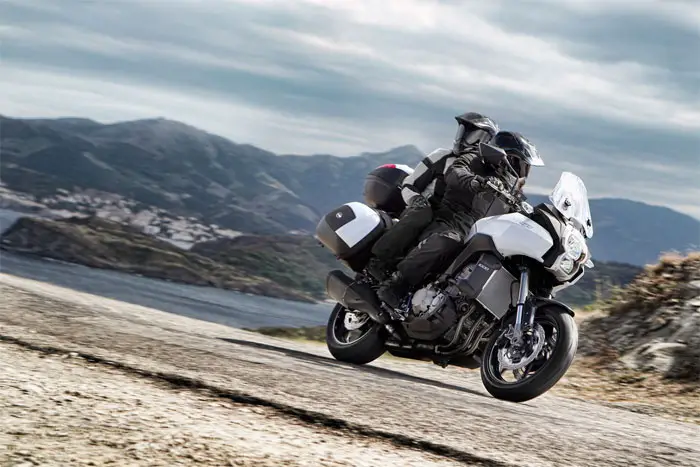
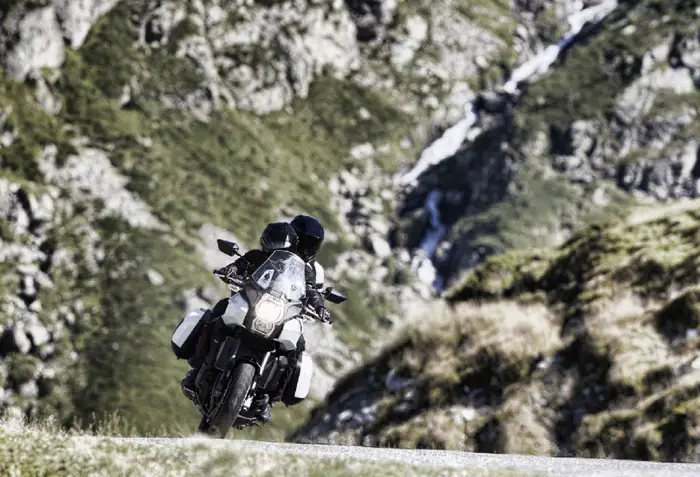
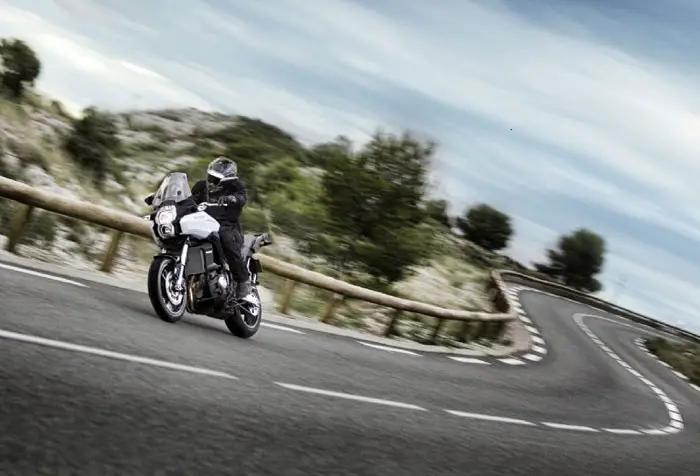
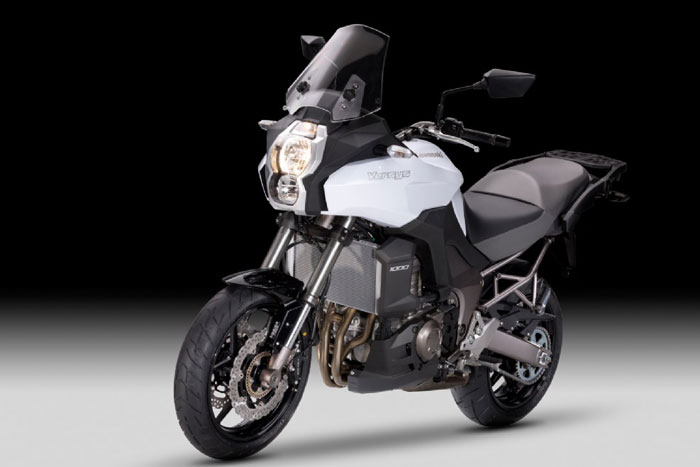
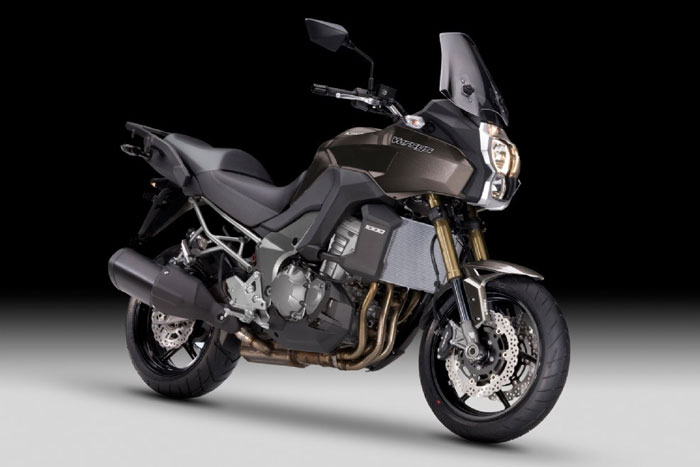
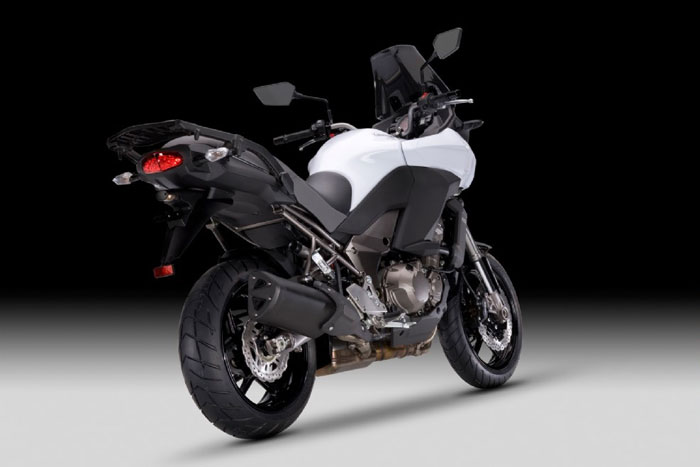
No comments:
Post a Comment